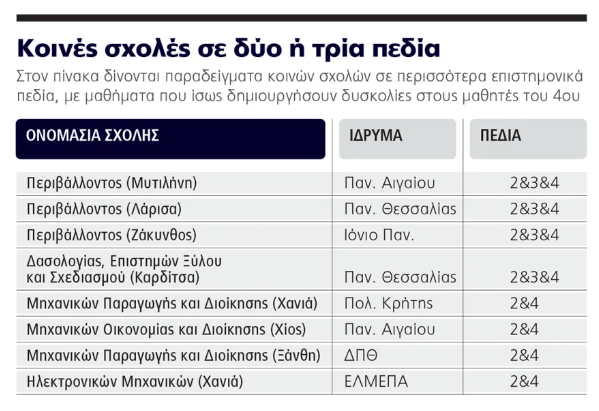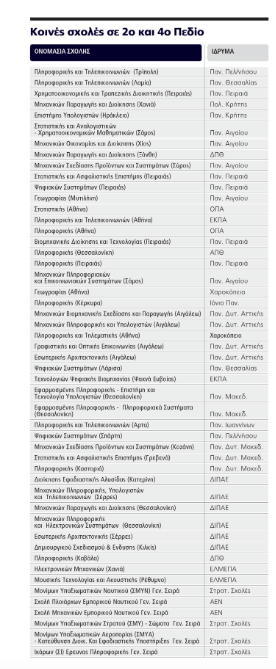“Education or Career?” is the pivotal question that applicants must address before commencing the application process, beginning today or tomorrow and closing on July 18. An essential aspect in deciding on a university program lies in meticulously reviewing the Study Guide and evaluating the courses available. The potential career opportunities and their alignment with the job market will undoubtedly be taken into account. Additionally, family and social considerations play a role in selecting schools, such as the practicality of supporting studies at a local university, the ability to earn transferable credits, or finding suitable institutions for future academic transitions. should place their preferences at the top of the list of computer science school selection criteria and ask themselves questions like: “Do I want a lot of free time or a lot of money? Do I want to work with others or alone? Do I want my work to involve travel or not? Do I want to be a freelancer or an employee?”
“The combination of work values with a bachelor’s degree, a master’s degree, and, of course, the ‘luck’ factor, leads to the profession,” says mathematician-analyst Stratos Stratigakis. Additionally, the prospects for further specialization through postgraduate or doctoral programs must be considered, as well as the academic adequacy of the departments to ensure the quality level of the studies.

Schools with Immediate Professional Rehabilitation
1st Orientation Group: Humanities
Psychology schools have immediate professional rehabilitation. “There is a great need in the market. Currently, psychologists’ salaries are very high,” emphasizes career guidance consultant Konstantinos Kotios, founder of LABORA. A new Department of Psychology has been established this year at the Democritus University in Didymoteicho. “The entry threshold will be the lowest of all Psychology departments, certainly 200-300 points less than that of Florina,” adds Stratigakis.
“Social workers are quickly professionally rehabilitated, given the implementation of modern social policies for vulnerable groups, such as abused women or immigrants,” Kotios points out.
“Law remains a strong field,” says Stratigakis: “New specialties have been added, such as Space Law, Sports Law, Environmental Law, Intellectual Rights on the Internet… Additionally, in the 1st Orientation Group, there are five Public Administration Schools in Athens, Trans-Balkan in Thessaloniki, and the three departments of International European Studies – where by choosing specific courses, one can obtain the professional rights of an economist. Graduates of the 1st Field may also find opportunities in the business world – human resource management, management, marketing (where Mathematics is not required).”

2nd Orientation Group: Positive Studies
The rule is that “anything related to technology leads immediately to work.” A recent survey by the National Technical University of Athens (presented by protothema.gr) shows that unemployment among its graduates does not exceed 2%.
“Electricians and Mechanical Engineers are challenging faculties but lead to diverse fields: energy, environment, telecommunications, networks, IT, agriculture, and Artificial Intelligence. IT schools remain important due to the global shortage of programmers. Finally, a good specialization is in chemistry, with a wide range of professional prospects, including food and chemical engineering, which is in high demand in industries.”
3rd Orientation Group: Health Studies
A medical degree opens all doors in all states, and as a science, it “fits” everyone: “Those admitted will find one of the 41 specialties that suit their personality,” says Stratigakis.
Additionally, “because the Western world is aging, nurses, physical therapists, among others, are needed,” explains Kotios, emphasizing: “Occupational Therapy is first in professional opportunities. There is one school in Athens, and one in Ptolemaida, with 60 students in one university, and 80 in the other. Veterinary medicine also has immediate professional rehabilitation, with only two schools – in Thessaloniki and Karditsa.
4th Orientation Group: Economics and IT Studies
Popular Choices
Business Management is a top choice for those seeking lucrative careers. “All the golden boys that children admire come from Economics and Business Administration,” notes Mr. Stratigakis. He highlights the rising popularity of the Marketing and Communication Department at the Athens University of Economics and Business (OPA), as well as the Department of Administrative Science and Technology.
Maritime studies also offer promising careers. The Maritime Department in Chios provides education comparable to the University of Piraeus, minus the English instruction, but with a much lower entry threshold: 10,150 points in Chios versus 17,780 in Piraeus. Shipping companies recruit equally from both schools. Additionally, the new Port and Shipping Management department in Psachna, Evia, which combines Logistics and Shipping, is noteworthy. The Statistics Departments are also a solid choice: besides the OPA, which requires 14,000 points, there are departments in Grevena and Samos, starting at just over 8,000 points.
Hidden “Jems”
Some departments initially appear obscure, with unclear study subjects or career prospects. “A typical example is the Department of Digital Systems in Piraeus, which is an IT Department. Or the Department of Supply Chain Management in Katerini, common to the 2nd and 4th Fields, requiring 9,275 points last year: Logistics, international transport, and trade are rapidly growing fields with quick job market entry. Agriculture is often misunderstood – consider the graduate who founded Augmenta and created a variable fertilization analysis system using Artificial Intelligence, then sold it for 111 million euros,” says Mr. Kotios.
The Department of Sports Organization and Management in Sparta offers excellent opportunities, with graduates learning modern business management tailored to the sports industry, and finding employment as sports managers or event organizers. The Environmental Departments in Mytilini, Zakynthos, and Larissa are strong choices for computer science.
Unconventional Career Paths
Mr. Kotios highlights several unique career paths: “A philologist who specialized in Computational Linguistics and works in a company of robotic systems using AI. A historical archaeologist working in museum digitization or creating video games for cultural institutions. Many companies seek specialists for creating videos for TikTok and social media in general – a Fine Arts graduate can focus on Digital Marketing, though the Department of Marketing and Communication at the University of Economics remains top with last year’s base of 16,500 points.”
Challenges in Computer Science
Some schools, common to several scientific fields, may present difficulties for students who have not studied certain subjects in the 3rd Lyceum. “The problem arises when students’ prior knowledge does not match their chosen field of study,” says Mr. Stratigakis. He cites the Environmental Departments included in the 4th Field: “Environmental studies involve Chemistry and Biology, subjects left behind in the 1st Lyceum – how will these students cope? Or the Production and Management Engineering Departments, which include many Physics courses – again, challenging for 4th Field students.”
Advantages for 4th Field Students
There are common sections between the 2nd and 4th Fields where 4th Field students have an advantage due to their subject exams. While 2nd Field students were tested in Physics, scoring low, 4th Field students competed in Informatics and Economics, scoring higher, which benefits them in admission to these common sections.
Engineering Departments Equivalent to Polytechnics
During this year’s completion of the computer engineering subject, candidates should consider the 18 Engineering Departments recognized as equivalent to Polytechnic Schools. Those not meeting the requirements for Civil Engineers at the National Technical University of Athens may hesitate between…
Ask me anything
Explore related questions





